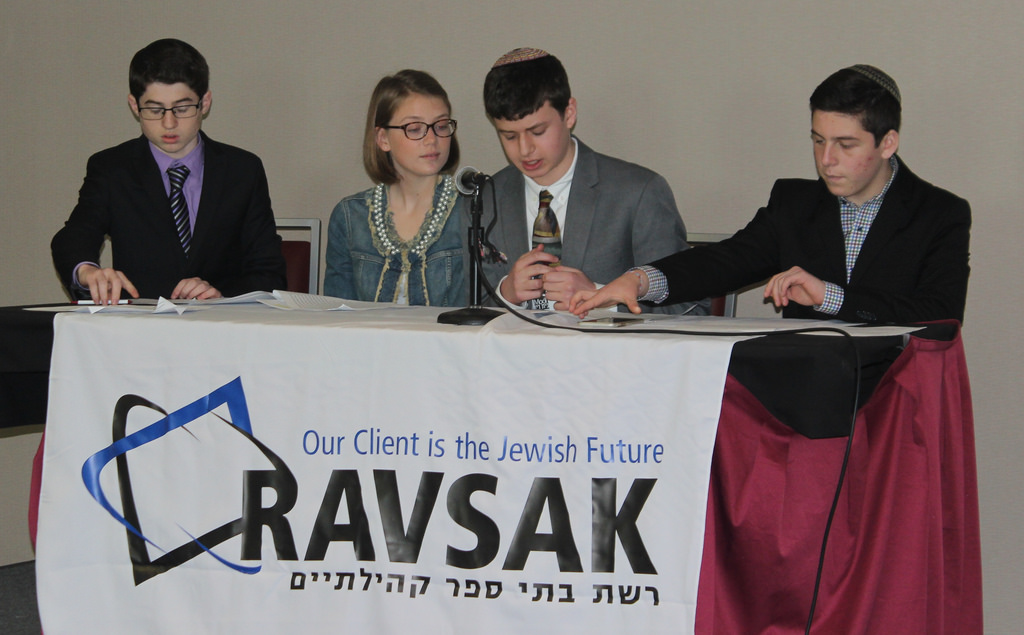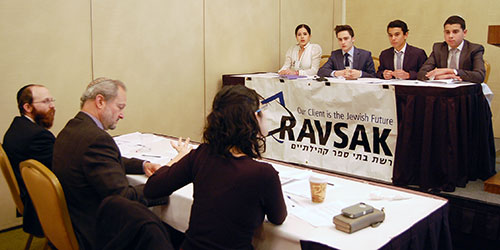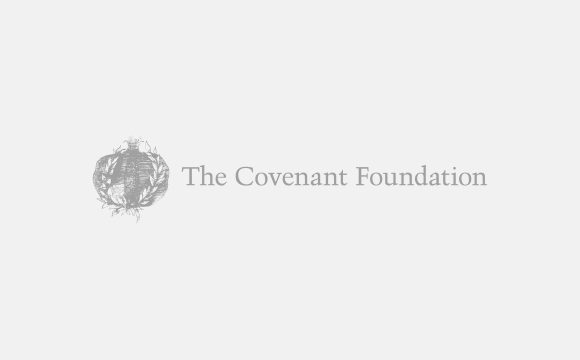

The Covenant Grants
The RAVSAK Moot Beit Din
Organization: RAVSAK: The Jewish Community Day School Network, New York, NY
Grant Year: 2011
Project Director: Dr. Elliott Rabin
Type of Grant: Signature
Grant Amount: $50,000 (1 year)
Website: https://ravsak.org/
The RAVSAK Moot Beit Din is a school-year-long program of intensive Jewish text study applied creatively to contemporary life that culminates in a weekend of competition and fun for students from non-Orthodox day high schools across North America.
The Covenant grant was intended to expand the scope and quality of a pilot Moot Beit Din. RAVSAK aspired to draw teams from all of its 31 member high schools, support the participating schools throughout the year, develop and vet new cases and sourcebooks each year for the competition, provide financial assistance to attend the annual Shabbaton and host the event at a hotel with quality kosher food.
The Moot Beit Din program features intensive study of halachic sources as they relate to a modern issue. Students prepare written decisions and then present and defend their opinions before a court of “judges,” experts in halacha who evaluate the results and select the winning teams.
The teams that go to the national competition, which takes place in a different location each year, are generally participants in school-level Moot Beit Din classes or clubs that help students develop their skills in textual analysis, their knowledge of Jewish law and their ability to negotiate halakhic decision-making in a collaborative environment.
At its core, the Moot Beit Din program is intended to help create a generation of Jews outside the Orthodox world who are familiar and comfortable with the material, tools, and concepts of Jewish law. It also endeavors to raise the bar for Jewish studies at non-Orthodox high schools, level the field for high schools with vastly different resources, increase the relevance of Jewish tradition as students learn to apply Jewish teachings to contemporary situations, and create a community of high school students from throughout North America united by interest in Jewish text study. Finally, the Moot Beit Din is intended to be a “feather in the cap” of the participating schools, a high-quality extra-curricular activity conveying skills that are viewed as eminently translatable to secular life.Moot Beit Din is a path-breaking program that enables students from Jewish high schools to delve into issues of Jewish law through creative engagement with contemporary situations. After intensive study of a range of traditional and modern Jewish sources, teams of students prepare written decisions to a case provided them. Students then present and defend their decisions before judges during oral arguments at a national competition with their peers from across North America.
Results/Impact
During the three years of the Covenant grant, RAVSAK was able to take the Moot Beit Din to the next level. In 2008, before the Covenant grant, the Shabbaton drew eleven teams, or 40 participants, from ten schools. In the first year of the grant, 2009, 16 schools and 60 students participated in the competition; in 2010, 21 schools and 79 students; and in 2011, 22 schools and 86 students. Each year 50 – 75 students not selected to go to the national event participated in the school-level classes or clubs.
Currently, the program draws 20 to 22 teams annually to its competition, and at four students per team, the competition alone serves 80 to 90 students each year. Approximately 100 other students participate in the classes or clubs at the school level each year.
The program has a second constituent base: teachers. One advisor attends the competition with each team, fortuitously creating a cohort of day high school teachers interested in this type of teaching and learning. RAVSAK is hoping to able to organize a day of intensive peer learning for these teachers, serving as both a reward and a tool to strengthen the school-level Moot Beit Din programs.
The program, now at capacity, is able to serve every school that wishes to participate but can only accommodate one team per school. In the future, RAVSAK hopes to expand the program to enable at least two teams from each school to attend.
RAVSAK began to live-stream the competition in 2014. At one moment in time, RAVSAK reports, over 1000 people were watching. RAVSAK hopes to develop a marketing strategy for this event and dreams of day school children gathering en masse across North America – at the equivalent of “Super Bowl” parties – to watch the competition.
Thinking big, RAVSAK is also considering how it might use the concept of an annual competition to highlight other Jewish content areas (in areas as diverse as music, theater and Hebrew language), teach new skills and bring like-minded day school students together.
Leadership
Program leadership has been stable since 2008. Executive Director Dr. Marc N. Kramer, a 2006 Covenant Award winner, oversees the project’s development and implementation. Dr. Elliott Rabin, the Project Director, handles recruitment, teacher training, development of materials, program facilitation, budgeting, and planning all aspects of the Shabbaton and competition. Other RAVSAK staff members, including a student programming expert, play important roles in program implementation.
At the school level, the advisor, a Jewish studies faculty member, is responsible for recruiting students, ensuring their and the school’s compliance with program requirements and deadlines, and facilitating student meeting, learning, and composing of the decision. The advisors chaperone their students at the Shabbaton, where they also perform leadership roles while coaching their group for the presentation at the competition.
Funding
In 2009, when the Covenant grant went into effect, the Foundation was the sole funder of the program. By the end of the grant, in 2012, RAVSAK had procured funding from several other sources that enable it to be an ongoing project. RAVSAK now has a full-time staff person focused on student programming whose salary is covered, in part, by grants for the Moot Beit Din. The budget remains modest because the program is partially covered by participant fees.

Engage With a Text, Watch the World Unfold: RAVSAK’s Case for Jewish Literacy
995
